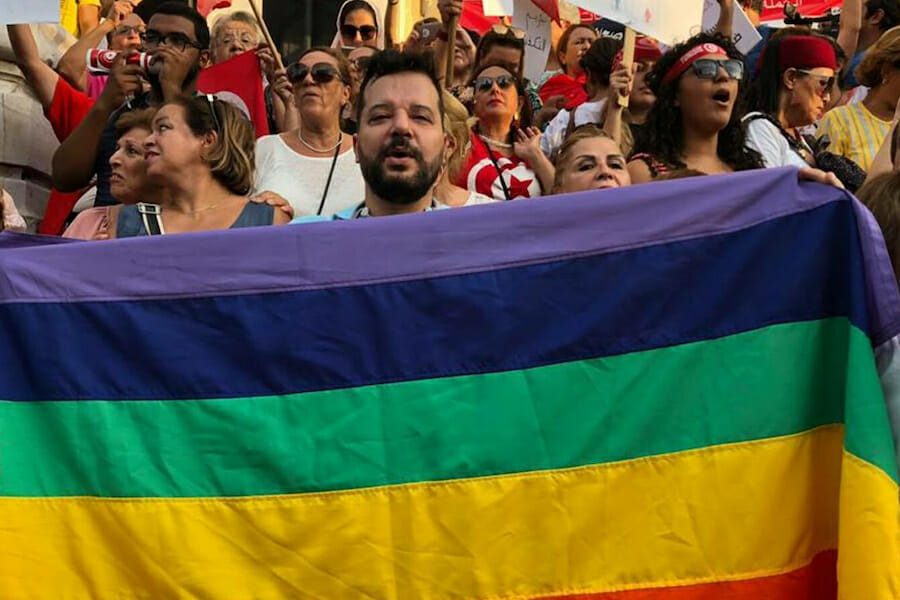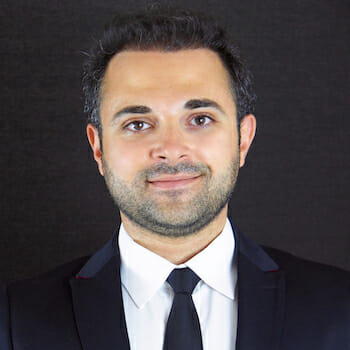
Mounir Baatour, First Openly Gay Candidate in Tunisia, is Running for President
For the first time in Tunisia’s history, an openly gay candidate is running for president.
“After so many years of struggle for minority rights, I understood that nobody can do the job better than me,” said Mounir Baatour, a lawyer, member of the political opposition and president of the first Tunisian organization for the rights of LGBT+ people. His organization, Shams Association, has been engaged in the decriminalization of homosexuality in Tunisia since 2014.
In a statement on Sabra FM radio, Baatour said he obtained the necessary approvals (more than 10,000 signatures required to be nominated as a candidate) to run for the next presidential election in Tunisia scheduled for next November 2019.
“Tunisia needs a democratic programme that can include the different identities, cultures, beliefs, and languages of this country. Our programme aims to democratise power, strengthen the Parliament and give more weight to local institutions,” he said on his Facebook page.
In 2013, Baatour was arrested for alleged sodomy, which is considered illegal in Tunisia. In January 2019, Baatour told the French Le Point: “homosexuals are citizens without rights in Tunisia.”
Homosexuality is still a political and societal taboo in Tunisia. Aside from the fact that a majority of Tunisians believe homosexuality is a mental illness, there are many who call for murdering members of the LGBT+ community. In 2015, several young people were arrested on charges of homosexuality.
In 2016, a number of Tunisian celebrities and well-known individuals demanded the cancelation of Article 230 of the Penal Code, which criminalizes homosexuality.
While the current president, Beji Caid Essebsi, is no longer in question as a candidate for next presidential election, Tunisia is set to elect a new president in November 2019.
In an interview via email, Baatour, when asked how he would deal with different political orientations such as conservatives and Islamists in Tunisia, he said: “If I become president, I will launch a popular referendum to change the constitution and to proclaim a secular state, the only guarantee of respect for all political and religious orientations. I consider the Islamist party Ennahdha as an ideological and political incubator of extremism and fundamentalism and I will not allow it to be associated with any form of government.”
With the Tunisian economy on a downturn and unemployment high, Baatour said, “I’m for a liberal economy and tax fairness. The first thing I will do is to change the national currency in order to force the informal sector to pass the money that circulates in the dark through the banks. Secondly, is that any state aid cannot go through any bank account in order to eradicate fraud in the aids granted to the target persons. This will allow to integrate the informal economy into the formal and taxable economy and to increase the tax revenues of the state and the purchasing power of Tunisians. Another thing is that I will encourage foreign direct investment by removing any prior authorization to investment. I will also remove the governor’s authorization for any purchase or sale of a real estate by foreigners in Tunisia.”
When asked what exactly he meant when he’s said that Tunisia needs a democratic program to include different identities, cultures, beliefs, and languages: “Tunisia has more than three million years of history, many civilizations have passed through it. Tunisian Identity is plural and all the cultures and beliefs that make up the current Tunisian civilization must be respected. I will subscribe the Amazigh (Berber) civilization in the constitution and I will have the Amazigh language taught in schools. I will also delete Article 74 of the Constitution which prohibits non-Muslims from running for Presidency and I will remove the law that prohibits proselytizing for a religion other than Islam.”
Finally, given the historic nature of his candidacy, he was asked how he would decriminalize homosexuality given the conservative attitudes towards homosexuality in Tunisia: “Political will is needed to reduce homophobia in society. When in 1956 President Bourguiba banned polygamy, allowed abortion and adoption and banned the repudiation of women, at that time the Tunisian people were very conservative but there was enough of political will to impose these reforms. Today too, political will is needed to decriminalize homosexuality and fight homophobia. Even though the people are conservative, they will adapt to the reforms.”


